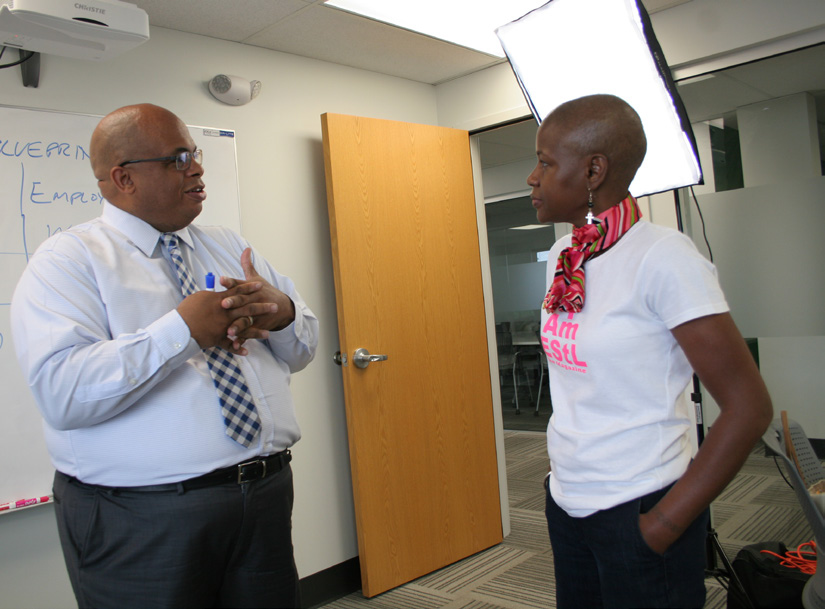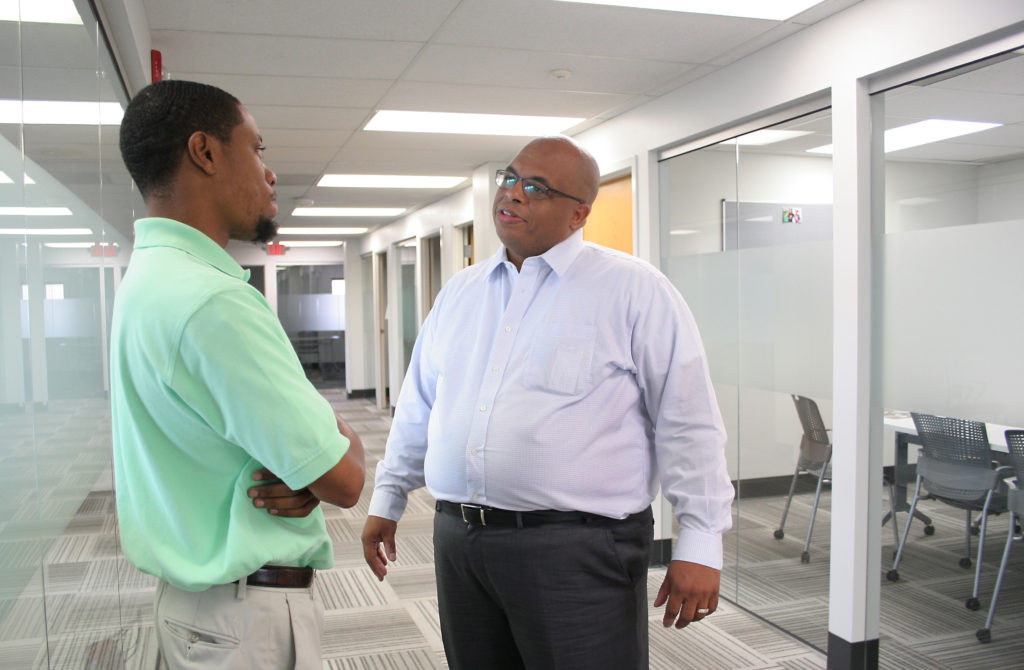BY Charlotte Beard PHOTOS BY Kevin Hopkins
This interview with Dr. Nunn was originally published in I Am East St. Louis, July – September 2017 issue. Concordance Academy obtained permission to re-publish.
How does an East St. Louis Lincoln Sr. High School graduate go from obtaining a Bachelor of Arts in Music to a Doctor of Management degree? That is the exploration I took during a conversation with Dr. Roderick Nunn, Executive Vice President for Education and Employment at Concordance Academy of Leadership. Concordance Academy is dedicated to restoring the lives of those previously incarcerated, rebuilding families, transforming communities and advancing the field of re-entry services.
At the on-set of our conversation, Dr. Nunn shared, “I was in the East St. Louis Lincoln Jazz Band. I was an all-state trombonist for two years in a row. I won the statewide music composition contest. I had music scholarships to some of the top schools in the country, but I didn’t pursue music as a profession after I got out of college, which turned out to be a great decision for me.”
How did you start in music and end up in Education and Workforce Development? “I had a two-parent household. I had a pretty strong church family around me, but I also had a mentor. Ron Carter, former jazz band director at East St. Louis Lincoln, went on to be the director of jazz studies at Northern Illinois University. Mr. Carter was one who challenged me to be something greater than I could imagine. So, music initially was a way for me just to sort of occupy my time. It ended up becoming a way to pay for college and an outlet to develop some lifelong skills that have served me very well as a leader and educator.”
Dr. Nunn shared how he spent 2 1⁄2 semesters at Berkelee College in Boston before transferring credits to Southern Illinois University Edwardsville (SIUE) where he received his music degree and found his love for leadership.
“After leaving Berkelee, I found myself being really engaged in student activities and Greek life at SIUE, which nurtured my interest in leadership and community service. I ended up pledging Omega Psi Phi and holding lots of student leadership positions. After moving to Springfield and studying public administration at [University of Illinois Springfield] (UIS), I was able to secure internships and get exposed to the workforce development profession, which is where education and employment meet – the idea of training people for jobs… During this time, I was also elected statewide as the student member to the Illinois Board of Higher Education, worked for State Representative Wyvetter Young, who chaired the higher education committee…and then staffed the governor’s state workforce board. Those were things that really got me passionate about education.”

Tell us about your public roles after you came to Missouri. “When I came to Missouri I was appointed as State Workforce Director…. I had authority over 42 offices and over 1,000 workforce professionals charged with providing job placement and training to Missourians. Then I got promoted to the governor’s front office where I still had the same responsibilities…but then they gave me P-20 education. This was an initiative where we were trying to make sure each level of education prepared students… There are transition points all the way through elementary, middle school…high school to college. So, we were trying to better integrate and link those transition points so that folks would have better outcomes. I also led the [Science, Technology, Engineering and Mathematics] (STEM) initiative, trying to increase the number of STEM graduates in Missouri. I eventually left state government and became the face of workforce development for St. Louis Community College and president of the Forest Park campus.”
Would you say all your experiences, including the leadership aspect of your time in college while studying music, led you to where you are now? “When I got offered the job [at Concordance] Danny Ludeman [President and CEO] called me and said, ‘Rod, everything you’ve done in your life prepared you for this job. That means everything, not just St. Louis Community College, not just your governmental experience in workforce development, but [also] growing up in East St. Louis and having friends and family who are incarcerated, [and] your ministry work…’ I really, really feel like that’s true. I feel like I’m in the right place now…I have been blessed to develop all these skills in the mainstream, leading workforce development programs for three governors and being an executive at one of the largest community colleges in the country. I’m well-prepared to take those skills and put them to work.”
What has been your greatest challenge at Concordance? “I am my greatest challenge. I take this work very seriously…I kind of judge myself by how they [participants] are doing and that’s kind of the life I have lived with every job I’ve had…it’s just a burden – a heart for the work that I bring to it… We are working with our participants six months before they get out [of prison]… We start them on a whole range of things, including education, job readiness, behavioral health…They all have a life plan which will include a career blueprint so we know their strengths, limitations, skills and career goal. We build an education and employment plan around those. This is very difficult but rewarding work. Whether it is workplace simulation experiences to practice soft skills development or prepping them for [a] National Career Readiness Certificate, we are targeting specific interventions to the needs of our participants to prepare [them] for immediate employment and putting [them] on a pathway to success.”

How does the educational platform at Concordance contribute to lowering reincarceration? “Releasees are more likely to be re-incarcerated if they are uneducated or under-educated, and unemployed releasees are 3-5 times more likely than those who are employed to be re-incarcerated. So, you can’t stay out of prison without a job and you can’t get a good job without having a solid educational background… We take the pathways approach. We call it ‘Now, Next, Later.’ We try to do some career exploration around the types of jobs that they would be successful at. But we also try to get them to a place where they understand that first job right after you get out might not be your dream job, but it must pay a living wage, get you some experience, help you develop skills… We promote continuing education and training with progressive wages over time. Our job coaching component continues for several months after they are employed. We talk with them weekly about how they’re experiencing work. We talk to their supervisors, help troubleshoot, and mentor through…. In addition, they will always have a place to come back to as alumni of the academy as they progress.”
We are targeting specific interventions to the needs of our participants to prepare [them] for immediate employment and putting [them] on a pathway to success.
What do you feel is missing from education programs in general? “The more we can connect industry to our students in both formal and informal ways, several good things happen. One: Students get to see their future. They get to see what’s possible, particularly, if you involve African American professionals in the process. They get to see people that look like them and connect with their stories. That’s on a personal level so education becomes relevant. I understand why I [must] do well in English… math and why critical thinking is important in the workplace….
That makes sense to me now because I have a connection to what it looks like in the future for me and what’s possible. Two: I think it breathes life into the curriculum and makes it more relevant – not just from what students perceive but from what they’re learning. I think that we can’t have enough of those industry associations and connections. In the classroom, that can take place in terms of one-on-one mentoring relationships. It could also be students going out on tours and visits, summer intern programs, apprenticeship programs, having career and technical education…”
Despite all of Dr. Nunn’s accomplishments, he holds to the importance of being connected to his roots. He now lives in St. Peters, MO, but he shared his parents still live on 80th Street in East St. Louis and he visits there frequently. “When I run into someone who is not from East St. Louis…and they see my resume…they have this sort of strange look like ‘you made it? It must have been so difficult for you,’” stated Dr. Nunn. He continued, “If I wasn’t from East St. Louis, I don’t know that I would be where I am. East St. Louis gave everything to me. Ron Carter was in East St. Louis…I wouldn’t trade anything in the world for putting the name East St. Louis behind my name and what it represents and what it gave me. I wouldn’t trade places with anybody for that.”